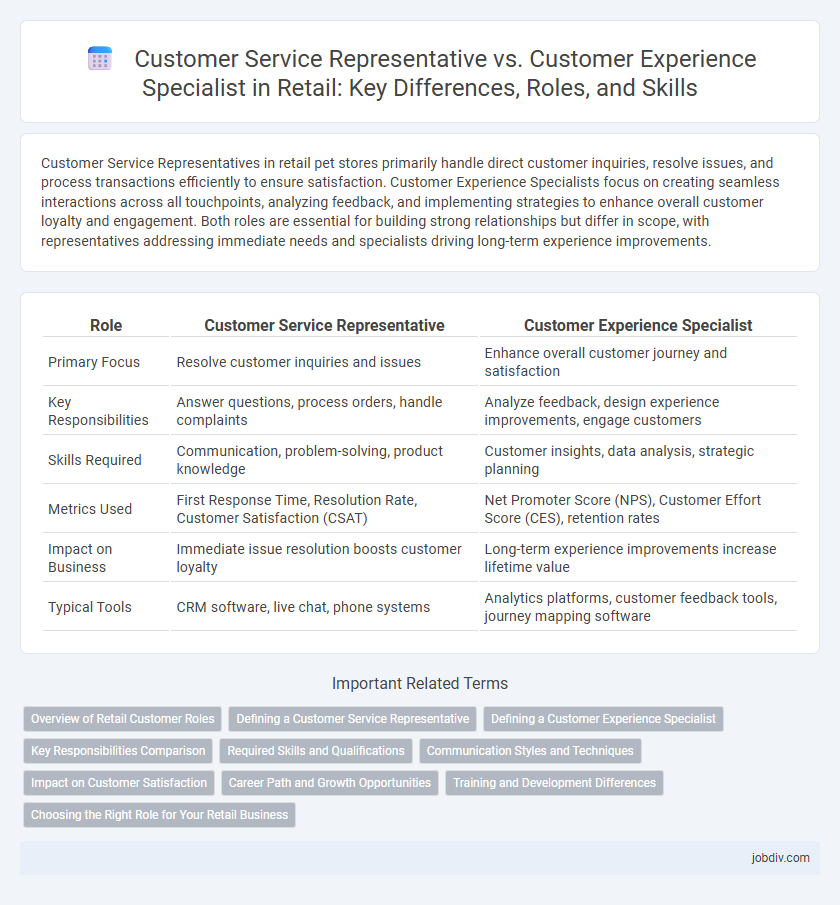Customer Service Representatives in retail pet stores primarily handle direct customer inquiries, resolve issues, and process transactions efficiently to ensure satisfaction. Customer Experience Specialists focus on creating seamless interactions across all touchpoints, analyzing feedback, and implementing strategies to enhance overall customer loyalty and engagement. Both roles are essential for building strong relationships but differ in scope, with representatives addressing immediate needs and specialists driving long-term experience improvements.
Table of Comparison
| Role | Customer Service Representative | Customer Experience Specialist |
|---|---|---|
| Primary Focus | Resolve customer inquiries and issues | Enhance overall customer journey and satisfaction |
| Key Responsibilities | Answer questions, process orders, handle complaints | Analyze feedback, design experience improvements, engage customers |
| Skills Required | Communication, problem-solving, product knowledge | Customer insights, data analysis, strategic planning |
| Metrics Used | First Response Time, Resolution Rate, Customer Satisfaction (CSAT) | Net Promoter Score (NPS), Customer Effort Score (CES), retention rates |
| Impact on Business | Immediate issue resolution boosts customer loyalty | Long-term experience improvements increase lifetime value |
| Typical Tools | CRM software, live chat, phone systems | Analytics platforms, customer feedback tools, journey mapping software |
Overview of Retail Customer Roles
Customer Service Representatives in retail focus on resolving immediate customer issues, processing transactions, and providing product information to ensure smooth daily operations. Customer Experience Specialists analyze customer interactions and feedback to design strategies that enhance overall satisfaction and loyalty across multiple touchpoints. Both roles are critical, with the former addressing direct inquiries and the latter driving long-term engagement and brand perception.
Defining a Customer Service Representative
A Customer Service Representative (CSR) in retail serves as the frontline contact, addressing inquiries, resolving complaints, and facilitating transactions to ensure customer satisfaction. CSRs possess strong communication skills and product knowledge, enabling efficient problem-solving and support throughout the purchasing process. Their role emphasizes reactive assistance, directly interacting with customers to maintain service quality and uphold brand reputation.
Defining a Customer Experience Specialist
A Customer Experience Specialist in retail focuses on enhancing the overall customer journey by analyzing feedback and implementing strategies that improve satisfaction and loyalty. This role goes beyond traditional customer service by integrating data-driven insights and personalized interactions to create seamless, positive experiences across multiple touchpoints. Expertise in customer behavior analytics, journey mapping, and CRM tools defines a Customer Experience Specialist's impact on brand reputation and revenue growth.
Key Responsibilities Comparison
Customer Service Representatives primarily handle direct customer interactions, resolving inquiries and complaints efficiently to ensure customer satisfaction. Customer Experience Specialists focus on analyzing customer feedback and optimizing the entire customer journey to enhance brand loyalty and retention. Both roles contribute to improving retail operations, but the specialist role emphasizes strategic improvements while representatives address immediate service needs.
Required Skills and Qualifications
Customer Service Representatives require strong communication skills, problem-solving abilities, and proficiency in CRM software to efficiently address customer inquiries and resolve issues. Customer Experience Specialists need advanced analytical skills, expertise in customer journey mapping, and a deep understanding of customer behavior to enhance overall brand loyalty and satisfaction. Both roles demand emotional intelligence and adaptability, but Customer Experience Specialists often require experience in data-driven decision-making and cross-functional collaboration.
Communication Styles and Techniques
Customer Service Representatives primarily use reactive communication, focusing on resolving specific issues through clear, concise dialogue and active listening to ensure customer satisfaction. Customer Experience Specialists employ proactive techniques, utilizing empathetic storytelling and personalized interactions to foster long-term loyalty and enhance overall brand perception. Both roles integrate digital communication tools, but the specialist often leverages feedback analytics to tailor messaging strategies and improve customer engagement across multiple touchpoints.
Impact on Customer Satisfaction
A Customer Service Representative directly addresses customer inquiries and resolves issues, ensuring immediate satisfaction through effective communication and problem-solving skills. In contrast, a Customer Experience Specialist designs and implements strategies that enhance the overall customer journey, influencing long-term loyalty and positive brand perception. Both roles are crucial in retail for maximizing customer satisfaction but operate at different touchpoints within the customer interaction lifecycle.
Career Path and Growth Opportunities
Customer Service Representatives primarily handle direct interactions to resolve issues and provide support, serving as foundational roles in retail with clear pathways to supervisory positions. Customer Experience Specialists focus on enhancing overall customer journeys through strategic improvements, often leading to career opportunities in marketing, analytics, or management. Retail professionals can leverage the skills gained in these roles to advance into leadership positions, driving innovation and customer-centric strategies.
Training and Development Differences
Customer Service Representatives concentrate on training programs focused on resolving customer inquiries efficiently and mastering communication protocols, emphasizing real-time problem-solving skills. Customer Experience Specialists undergo advanced development in customer journey mapping, emotional intelligence, and data analytics to proactively enhance overall brand perception. Training for Specialists often includes cross-functional collaboration and strategic feedback implementation, expanding beyond immediate response tactics used for Representatives.
Choosing the Right Role for Your Retail Business
Choosing between a Customer Service Representative and a Customer Experience Specialist depends on your retail business goals and customer interaction strategy. Customer Service Representatives address immediate customer inquiries and resolve issues efficiently, ensuring smooth transactional support. Customer Experience Specialists focus on enhancing the overall shopping journey through personalized engagement and feedback analysis, driving long-term loyalty and brand differentiation.
Customer Service Representative vs Customer Experience Specialist Infographic

 jobdiv.com
jobdiv.com